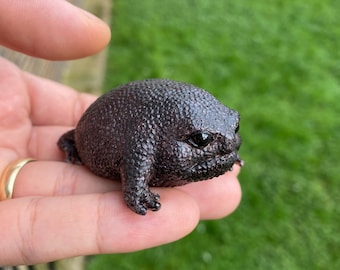Obtain Your Hands on a Rain Frog for Sale: Experience the Joy of Unique Pet Possession!
Obtain Your Hands on a Rain Frog for Sale: Experience the Joy of Unique Pet Possession!
Blog Article
Common Health And Wellness Issues in Reptiles: Signs and Solutions
In the elaborate world of reptile care, recognizing the typical wellness issues that might affect these unique animals is extremely important in ensuring their health. Whether it's grappling with parasitical invasions, browsing dehydration worries, or resolving skin conditions that manifest in subtle ways, being attuned to the signs and symptoms and outfitted with the expertise of efficient remedies is crucial for any kind of reptile owner.
Respiratory Infections
Respiratory system infections in reptiles can considerably influence their general health and wellness and need punctual focus from knowledgeable veterinarians. These infections are commonly brought on by germs, fungis, or infections and can materialize with signs and symptoms such as hissing, nasal discharge, open-mouth breathing, and sleepiness. In reptiles, respiratory system infections can be specifically testing to detect and deal with because of their special composition and physiology. Veterinarians commonly rely upon a mix of physical exams, analysis imaging, and lab examinations to precisely determine the underlying root cause of the infection.
Treatment for respiratory system infections in reptiles normally includes a mix of helpful care, such as preserving proper moisture degrees and temperature level slopes in the room, along with targeted drug to resolve the specific pathogen in charge of the infection. It is crucial for reptile owners to monitor their family pets very closely for any kind of indications of respiratory distress and look for vet treatment at the earliest indicator of an issue. With timely intervention and proper therapy, many reptiles can recoup totally from breathing infections and resume regular tasks.

Metabolic Bone Condition
What factors add to the growth of Metabolic Bone Condition in reptiles?
Metabolic Bone Disease (MBD) in reptiles is mostly triggered by an absence of proper calcium, phosphorus, and vitamin D3 levels in their diet plan. When reptiles do not obtain sufficient calcium, either via their food or appropriate UVB exposure for vitamin D3 synthesis, they go to a high threat of creating MBD. Reptiles with diet plans reduced in calcium or unbalanced calcium to phosphorus proportions are especially susceptible. In addition, poor exposure to UVB light stops reptiles from manufacturing vitamin D3, which is vital for calcium absorption and bone health and wellness.
Other adding elements to MBD consist of incorrect temperature level gradients within the reptile's environment, bring about decreased metabolic rate and damaged calcium absorption. Insufficient humidity degrees can also affect a reptile's capacity to metabolize calcium efficiently. Moreover, specific reptile types have details nutritional requirements that, if not met, can boost the likelihood of creating MBD. Normal vet examinations, correct husbandry techniques, and a balanced diet regimen are vital to protect against Metabolic Bone Illness in reptiles.
Parasitic Invasions
Parasitic infestations posture a substantial health and wellness risk to reptiles, affecting their total health and calling for prompt veterinary focus. Reptiles can be influenced by numerous parasites, including mites, ticks, inner worms, and protozoa. These parasites can cause a series of signs and symptoms, such as weight management, sleepiness, my link skin irritation, looseness of the bowels, and even death if left neglected.
One common bloodsucker located in reptiles is the mite, which can trigger skin anemia, stress and anxiety, and irritation. Ticks are another outside parasite that can trigger and transmit conditions pain to the reptile. Inner bloodsuckers like worms and protozoa can bring about digestive system problems, malnutrition, and compromise the reptile's immune system.
To diagnose a parasitic invasion, a veterinarian may execute fecal examinations, skin scrapings, or blood tests. Therapy commonly includes deworming medications, antiparasitic bathrooms, or in severe cases, hospitalization. Preventative steps such as routine vet check-ups, correct hygiene, and quarantine procedures for new reptiles can help reduce why not check here the risk of parasitical infestations and ensure the wellness of reptile pet dogs.
Dehydration and Hydration Issues
Dehydration in reptiles can substantially impact their wellness and wellness, demanding timely treatment and appropriate hydration administration. If left neglected, dehydration can lead to serious wellness concerns and also be deadly to the reptile.
To avoid dehydration, reptile owners should make sure that their pets have accessibility to tidy water in all times. The water dish ought to be big enough for the reptile to take in if required, specifically for varieties that take in water with their skin. Additionally, keeping appropriate moisture degrees in the reptile's unit and supplying routine baths can aid stop dehydration.
In situations of dehydration, it is critical to seek vet care quickly. A vet might provide fluids either orally or through shots to rehydrate the reptile. It is vital to resolve the underlying source of dehydration to stop recurrence and make certain the reptile's total well-being.
Skin Conditions
Conclusion

Respiratory system infections in reptiles can substantially affect their overall health and wellness and call for prompt attention from seasoned veterinarians (rain frog for sale). Preventative procedures such as regular veterinary examinations, correct health, and quarantine treatments for brand-new reptiles can aid decrease the risk of parasitic infestations and make sure the health of reptile pets
If left without treatment, dehydration can lead to major health and wellness problems and even be deadly to the reptile.
On a regular basis checking your reptile for any type of adjustments in skin color, structure, or look can assist in very early discovery and therapy of skin disorders, advertising the total health and health of your scaly friend. - rain frog for sale
In conclusion, reptiles are vulnerable to different health problems such as breathing infections, metabolic bone disease, parasitical problems, dehydration, and skin disorders.
Report this page